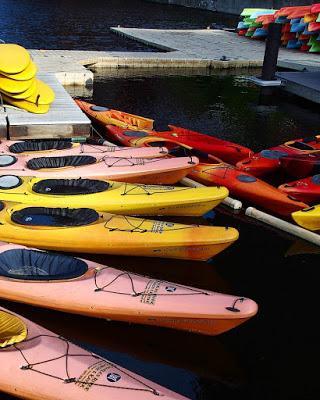
Kayaks by Marie Lossky
(@Marie.Lossky on Instagram)
And 2 questions for you: Has anybody tracked the longevity of athletes’ careers when yoga is thrown into the mix? Along these lines I have another question. Have there been any studies that show an increase in Vo2 max from a regular pranayama practice?
A: Before I briefly address this reader’s questions, I need to tell you that I was very intrigued by what he initially wrote to me so I sent him a few more questions to give me a better picture of his experience as a yogi and competitive paddler. Here are my questions along with his replies.
Baxter: Can you describe your yoga practice in the early days and how it has changed over time? Which yoga tools do you practice regularly? Asana, pranayama, meditation, and any others?
Ken: When I began practicing yoga in earnest it was all about getting to as many classes as possible. I would usually take three or four classes a week and as many workshops as I could. My approach was to have my asana practice be very physical and athletic. No pain, no gain.
A serious injury forced a totally different approach. I rarely attend classes these days and have a very sensitive, gentle and "sensational" home practice. I have learned to "feel" my way into poses and strive to "release" as opposed to "stretch"—a subtle difference but an important one. Most of my practice is asana based with breath work being an integral part. I also do some pranayama as well.
Baxter: How aerobic is your sport? How long is a typical race or event? What are the ranges of courses or times? Is it all like running, with short and long distance events?
Ken: My paddling is a pretty physical and aerobic experience. Over the years my races have ranged between 10-40 km with my favorites in the past being the longer ones. The last couple of years I have been leaning toward shorter events. I am hoping to do some longer distance races this season.
The races are really just the carrot to get out and paddle. I do a mix of Long-Slow-Distance training sessions that are between seven and twenty miles, mixed with various forms of high-intensity interval training. Both seem to be necessary to be competitive. In the last few years I have segued from paddling more traditional kayaks to high-performance surf skis. These are light, fast and tippy craft. They require much more core strength and balance. Longer events can be more of a challenge in terms of comfort and fatigue.
Baxter: Do you feel your yoga practice has had any potential benefit regarding reducing typical paddling injuries when you compare your health to that of your competitors?
Ken: My yoga practice has been profound in terms of my paddling performance. All athletes have the potential for injury. I can't really say with authority if I have fewer injuries than others but I know I have fewer than I would if I didn't have a regular yoga practice. When I do have injuries, I tend to recover more quickly. If I sense a problem, a sensitive approach to my practice often allows me to release spasming muscles. I like to call it "active healing"—very slow and gentle.
I train regularly for paddle events and achieve good results while having spent less time training than many of my peers. That is certainly the result of a regular yoga practice. An efficient paddle stroke is much like a well-done asana. It begins with grounding and engaging the whole body. Being able to relax your body and mind during competition makes a tremendous difference in the outcome. Better to be a willow than a brick.
As important as yoga is to my athletic endeavors, it also benefits most other aspects of my life. When I am not doing yoga or paddling, much of my time is spent in my shop building boats or furniture. Believe it or not, the likelihood of an injury is higher in the shop than on the water. Moving in a relaxed and mindful way is always a challenge when distracted by work! No doubt that yoga has helped there as well—the yoga of daily life.
Thanks, Ken!
And as for Ken’s questions, I could find no studies on whether professional athletes who do yoga have longer careers than those that don’t, but found a few off-hand comments to that effect in some online articles-yet another field for future yoga research. As to whether pranayama improves V02 max—a measure of excellent cardiovascular endurance and something desirable for endurance athletes—I did find a few studies that stated just that. For those interested in learning more, see Estimation of VO 2 max before and after Yoga Training in Healthy female Medical Students and Effect of Yogic exercises on aerobic capacity (VO2 max.
—Baxter
Subscribe to Yoga for Healthy Aging by Email ° Follow Yoga for Healthy Aging on Facebook ° Join this site with Google Friend Connect

